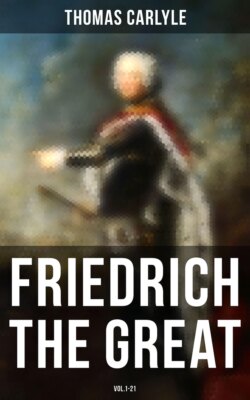Читать книгу Friedrich the Great (Vol.1-21) - Томас Карлейль - Страница 151
На сайте Литреса книга снята с продажи.
Chapter IV. — DOUBLE-MARRIAGE PROJECT IS NOT DEAD.
ОглавлениеTable of Contents
And the Double-Marriage, in such circumstances, are we to consider it as dead, then? In the soul of Queen Sophie and those she can influence, it lives flame-bright; but with all others it has fallen into a very dim state. Friedrich Wilhelm is still privately willing, perhaps in a degree wishful; but the delays, the supercilious neglects have much disgusted him; and he, in the mean while, entertains those new speculations. George II., never a lover of the Prussian Majesty's nor loved by him, has been very high and distant ever since his Accession; offensive rather than otherwise. He also is understood to be vaguely willing for the thing; willing enough, would it be so kind as accomplish itself without trouble to him. But the settlements, the applications to Parliament:—and all for this perverse Fred, who has become unlovely, and irritates our royal mind? George pushes the matter into its pigeon-holes again, when brought before him. Higher thoughts occupy the soul of little George. Congress of Soissons, Convention of the Pardo, [Or, in effect, "Treaty of Madrid," 6th March, 1728. This was the PREFACE to Soissons; Termagant at length consenting there, "at her Palace of the Pardo" (Kaiser and all the world urging her for ten months past), to accept the Peace, and leave off besieging Gibraltar to no purpose (Coxe, i. 303).] Treaty of Seville; a part to be acted on the world-theatre, with applauses, with envies, almost from the very demi-gods? Great Kaisers, overshadowing Nature with their Pragmatic Sanctions, their preternatural Diplomacies, and making the Terrestrial Balance reel hither and thither;—Kaisers to be clenched perhaps by one's dexterity of grasp, and the Balance steadied again? Prussian Double-Marriage!
One royal soul there is who never will consent to have the Double-Marriage die: Queen Sophie. She had passed her own private act-of-parliament for it; she was a very obstinate wife, to a husband equally obstinate. "JE BOULEVERSERAI L'EMPIRE," writes she once; "I will overturn the German Empire," if they drive me to it, in this matter. [Letter copied by Dubourgay (in Despatch, marked PRIVATE, to Lord Townshend, 3d-14th May, 1729); no clear address given—probably to Dubourgay himself, CONVEYED by "a Lady" (one of the Queen's Ladies), as he dimly intimates.] What secret manoeuvring and endeavoring went on unweariedly on royal Sophie's part, we need not say; nor in what bad element, of darkness and mendacity, of eavesdropping, rumoring, backstairs intriguing, the affair now moved. She corresponds on it with Queen Caroline of England; she keeps her two children true to it, especially her Son, the more important of them.
